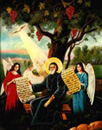|
|
|

Mor Ephraim
|
|
Mor Ephraim the Syriac
“The lyre of the Holy Spirit” the saint and the sun of the Syriac Church, was born in A.D. 303 (or 306) in Nisibis (Tourabdin-North west Turkey).
Mor Ephraim was a deacon to Bishop Yacob of Nisibis and tutor in theology,  ”he went to teach at the academy in Edessa when his native town was ceded to the Persians in 363; his record of these events in verse, Kromonitho Nsibonoyto (Carmina Nsibina "Song of Nisibin") constitutes a valuable historical source. Mor Ephraim lived as a solitary and never entered into priesthood he became only a deacon, in the preparation phase to become a monk, and refused to go to be ordained a monk saying that I don’t deserve such a high position in priesthood. He is remembered as a great doctor of the Catholic Church (according to Pope Benedict XV formally declaration in 1920). His memory is commemorated in the Syriac Orthodox Church on the first Saturday of the Lent. ”he went to teach at the academy in Edessa when his native town was ceded to the Persians in 363; his record of these events in verse, Kromonitho Nsibonoyto (Carmina Nsibina "Song of Nisibin") constitutes a valuable historical source. Mor Ephraim lived as a solitary and never entered into priesthood he became only a deacon, in the preparation phase to become a monk, and refused to go to be ordained a monk saying that I don’t deserve such a high position in priesthood. He is remembered as a great doctor of the Catholic Church (according to Pope Benedict XV formally declaration in 1920). His memory is commemorated in the Syriac Orthodox Church on the first Saturday of the Lent.
Mor Ephraim wrote exclusively in Syriac, but his works were translated into Armenian and Greek, and via the latter into Latin and other languages. He produced a wealth of theological literature with more than 3,000,000 lines of great beauty and insight with a heptagon-meter (seven-sellable meter) which, later on called “the Ephraimian”. He established the first women-choir in the Syriac Orthodox Church in Edessa because he believed woman has to have a role in serving the mass. This action was like a revolution in the church. Because of his influence he could realize it and many other parishes than Edessa imitated this action thereafter.
Much of Mor Ephraim´s exegetical, dogmatic and ascetic works are in verse form. In 325 he followed with his teacher Mor Jacob of Nisbin to the first ecumenical council of the Christian church, meeting in ancient Nicaea. After the council he wrote several polemical works refuting the heresies of Arius of Alexandria that stated that Christ is not divine but a created being. Moreover he refuted the heresies of Marcion, Bardaisan and Mani too. He wrote widely regarded biblical commentaries on Genesis, Exodus and the Diatesseron (the 2nd-century Syriac-Greek version of the New Testament). In his writings he employs typology and symbolism.
His poetry is in two genres: Madroshe (hymns) and Mimre (verse homilies). His liturgical poetry had a great influence on Syriac, Coptic and Greek hymnography. Mor Ephraim emphasized devotion to the Virgin Mary, particularly her exemplary fidelity and virginity. He was the first one who called her the mother of God. Mor Ephraim´s graphic description of heaven contributed to the inspiration of Dante´s Divine Comedy.
Mor Ephraim departed to his heavenly abode on 9th of June, A.D. 373 and buried in Dairo Tahtayto near to the city of Edessa.
English translations of selections from Mor Ephraim´s writings are available in “his Hymns and Homilies”, edited by H. Burgess (2 vol., 1835), and in the edition of J. Gwynn in the collection Nicene and Post-Nicene Christian Fathers (1898).
References:
1) Beroulé Bdiré. H.H. Mor Eghnatious Epraim I
2) History of the Syriac Church Fr. Isak Armali
3) History of the Church of Orient Fr. Albert Abouna
4) History of Ashour and Caldo, Bishop Eddy Cher
5) Encyclopedia Britannica
6) Al Kharida Al Nafisa Bishop Isidoros
By: Fr. Namaan Oussi
|
 Show other articles Show other articles
|
«« Go back
|
|

